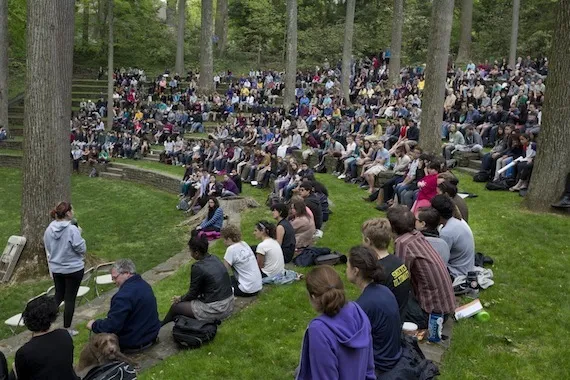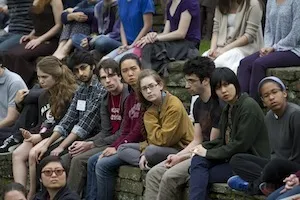Swarthmore Community Engages in Challenging Campus-Wide Conversations

Classes ended on Friday, May 3, marking the start of the reading period, when students traditionally prepare for final exams. But this year the campus during this period has been marked by various demonstrations, conversations, and meetings - large and small, formal and informal - revolving around students' concerns and frustrations pertaining to a variety of issues, including the sense of marginalization of students of color, queer and trans students; survivors of sexual assault advocating reform of the College's processes; and students who seek to have the College divest from fossil fuel companies.
"All of us who love Swarthmore," says President Rebecca Chopp, "know this is a community that thinks with rigor, that is self-critical always, and is aspirational in its ongoing work to live out values of respect, justice, peace, and the amelioration of suffering. Even when this means we have difficult conversations that identify real change that must occur, we take energy from our connections with one another and our belief in this power and importance of our life together."
Many of the efforts by student activists this semester coalesced this past Friday, when students held a rally outside Sharples Dining Hall in part to respond to someone having urinated on the door to the Intercultural Center the night before, the fifth known incident of its kind this semester. The event galvanized students actively involved in many issues to express their frustrations and discontent with the community's response to not just this event but to other practices and situations in which some feel unsafe and unwelcome.

The amphitheater conversation is one of many driven by students' concerns that has taken place this week.
On Saturday, approximately 100 students disrupted an open community meeting on divestment being hosted by the Board of Managers in the Science Center. Many students and a few alumni used the occasion to address members of the Board and others in attendance, who listened intently.
Over the next two days, students and administrative leaders negotiated in good faith, focusing on how to extend the conversation across the community and to identify action steps for the future. This led to several opportunities for community members to share their thoughts and ideas with each other.
Monday began with a community action meeting in Parrish Hall. Students organized and moderated discussions around three general topics: transparency, curricular development, and diversity support. Several dozen students joined faculty and staff in each of the parlors and the Shane Lounge over three-plus hours to identify goals related to each area. Some of the draft action items proposed include more curriculum focus on ethnic studies, gender and sexuality, and environmental studies; adding more faculty of color and more queer/transgendered faculty; better support systems for students of color and other marginalized groups; more transparency; changing the College's committee structures; and more and different types of support for those who have suffered sexual assault. The ideas continue to be in draft form.
The day continued with a Collection in the Scott Outdoor Amphitheater, where hundreds of students, faculty, staff, and alumni gathered to share and reflect in the Quaker tradition. For more than an hour, faculty and staff members listened as students and one alumna shared their personal, at times painful, experiences, as well as their thoughts on partnership, community, and the pride and hope they feel for the College's future.
Following Collection, faculty, staff and students shared a community meal in Sharples. Many took advantage of the opportunity to eat together to talk further about issues on campus and how best to address them.
Additional opportunities for students, faculty, and staff to discuss these issues occurred throughout Tuesday during a series of "teach-ins," moderated by students who were often joined by faculty members. The well-attended sessions took place largely in the Intercultural Center and the Lang Performing Arts Center. Faculty members have also met frequently this week, both formally and among each other, to discuss how they can best respond to student concerns.
As the semester draws to a close, debriefing sessions will occur, notes will be shared, and critiques will become action steps. Many hope that next year, Swarthmore College can come even closer to realizing its mission to be a place where intellectual students who care about improving the world can continue to thrive.
Updated, Fri., May 10: There have been many opportunities, and there will continue to be many opportunities, for the Swarthmore community to engage in deep, nuanced conversations that lead to action steps as a result of these recent events. Social media, student media, and other forms of virtual expression have served and will continue to serve to promote engaging and we hope, always, civil dialogue. There will not be any comments accepted on this story, whether positive or negative. We will look forward to robust, civil discussion in the fall where everyone in the community can discuss how best to improve Swarthmore. Now, it seems important to let students and faculty members, in particular, focus on their finals and their work.



